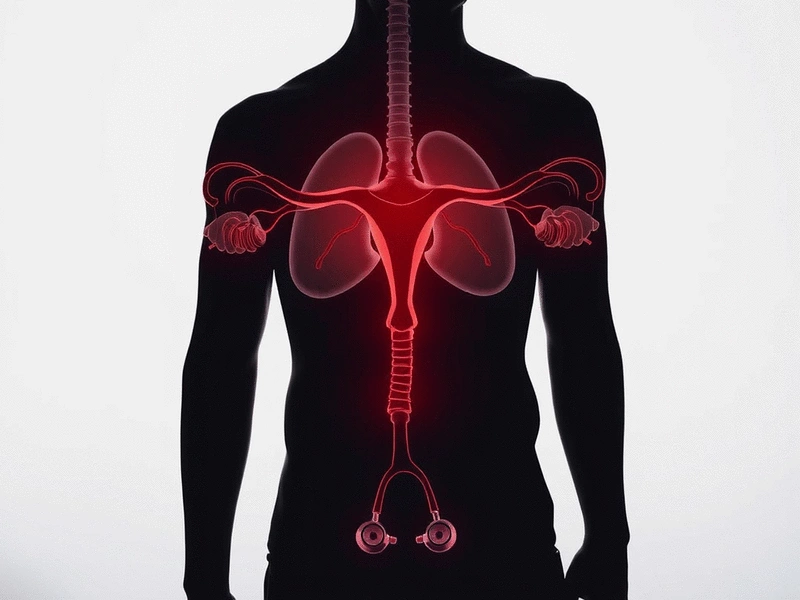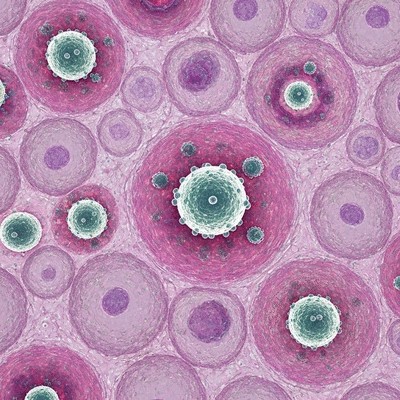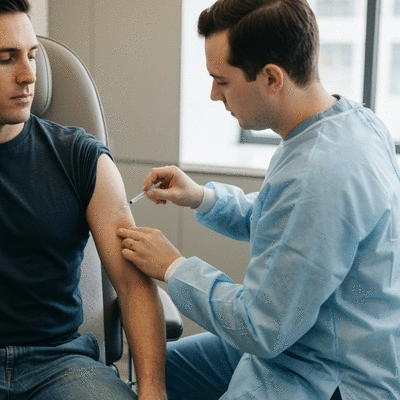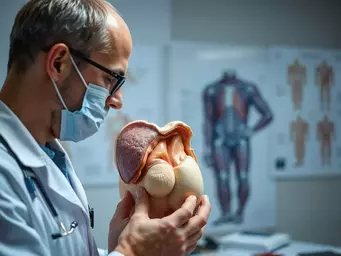Mumps Orchitis and Male Health

How well do you understand the impact of viral infections on men’s hormonal health? Exploring conditions like mumps orchitis can uncover surprising connections that affect vitality and well-being. Let’s dive into the crucial insights you need to know.
What You Will Learn
- Mumps orchitis primarily affects males, especially post-puberty, leading to severe inflammation and potential infertility.
- Inflammation of the testicles due to mumps can significantly impair testosterone production, resulting in symptoms of hypogonadism.
- Early diagnosis and treatment are essential in preventing long-term complications and preserving hormonal balance.
- Regular health check-ups and vaccinations, especially the MMR vaccine, are crucial in reducing risks associated with mumps orchitis.
The Impact of Mumps Orchitis on Male Health
Mumps orchitis, a viral complication, significantly impacts male reproductive health, potentially leading to hypogonadism. Understanding its mechanisms and the importance of early intervention is crucial for maintaining hormonal balance and overall vitality.
Defining Mumps Orchitis
- Affects males, primarily post-puberty.
- Causes severe testicular inflammation and pain.
- Can lead to long-term complications, including infertility.
Viral inflammation of testicles.
Link to Male Hypogonadism
- Testicular damage impairs testosterone production.
- Symptoms of testosterone deficiency may arise.
- Early intervention is crucial to mitigate effects.
Compromised hormone production.
Mechanism of Infection
- Mumps virus spreads via respiratory droplets.
- Invades and causes inflammation in testicles.
- Damages hormone-producing structures.
Viral invasion and immune response.
Importance of Early Intervention
- Prevents long-term complications (infertility).
- Manages symptoms for quicker recovery.
- Supports hormonal balance and mitigates deficiency.
Timely action for better outcomes.
Understanding Mumps Orchitis and Male Hypogonadism
At Hypogonadal Health, we aim to shed light on mumps orchitis and its unexpected link to male hypogonadism. Understanding these conditions is crucial for maintaining optimal health and vitality. Mumps orchitis, a complication of the mumps virus, primarily affects the testicles and can lead to serious consequences, including hormonal imbalances.
Have you ever wondered how a virus could impact hormone levels? It’s essential to grasp the underlying mechanisms at play. Let’s delve into what mumps orchitis really is and why it matters.
Defining Mumps Orchitis: What You Need to Know
Mumps orchitis occurs when the mumps virus causes inflammation of the testicles. This usually happens after a person contracts the mumps, a viral infection characterized by swelling of the salivary glands. While it’s less common now due to vaccination, understanding its definition and implications is vital.
- Mumps orchitis primarily affects males, especially post-puberty.
- It can result in severe testicular inflammation and pain.
- In some cases, it may lead to long-term complications, including infertility.
Recognizing these facts helps frame the conversation about how this viral infection can have lasting effects on men's health. If you have concerns about your hormone levels or related symptoms, consulting a specialist can provide clarity. For more detailed information on mumps and its complications, you can refer to resources from the CDC's Manual for the Surveillance of Vaccine-Preventable Diseases.
The Connection Between Mumps Orchitis and Male Hypogonadism
There’s a significant connection between mumps orchitis and male hypogonadism. When the testicles become inflamed, their ability to produce testosterone can be compromised. This is particularly concerning for men, as low testosterone levels can lead to a range of symptoms, including fatigue, depression, and decreased libido.
- Testicular damage from orchitis can impair hormone production.
- Men with orchitis may experience symptoms of testosterone deficiency.
- Early diagnosis and treatment are crucial to mitigate long-term effects.
As Dr. Maxwell Bennett, I’ve seen firsthand how delaying treatment can lead to complications. Understanding this connection emphasizes the importance of timely intervention. Further insights into the pathophysiology of mumps orchitis and its impact on testicular function are available from the National Center for Biotechnology Information (NCBI).
How the Mumps Virus Leads to Orchitis: Mechanisms Explained
The mumps virus primarily spreads through respiratory droplets and can invade the body, leading to inflammation of various organs, including the testicles. Once the virus enters the bloodstream, it targets the endocrine system, causing testicular swelling.

- The virus triggers an immune response, leading to inflammation.
- This inflammation can damage the delicate structures responsible for hormone production.
- Consequently, men may face hormonal imbalances and related symptoms.
Understanding these mechanisms can empower individuals to take proactive steps in managing their health. If you suspect you have had mumps or are dealing with orchitis, I encourage you to seek medical advice promptly to protect your hormone health.
Interactive Poll: Your Experience Matters!
Have you or someone you know experienced symptoms related to mumps orchitis or male hypogonadism? We want to hear from you! Share your thoughts below:
Summarizing Key Insights on Mumps Orchitis and Male Hypogonadism
In our journey to understand mumps orchitis and its association with male hypogonadism, it's crucial to highlight the significance of early intervention and treatment. Acting promptly can make a world of difference in managing symptoms and preserving hormone balance. If you suspect you might be experiencing symptoms, don’t wait to seek help!
Early diagnosis can lead to better outcomes, reducing the risk of complications such as infertility. By recognizing the signs and understanding the implications of mumps orchitis, we can empower men to take charge of their health.
Understanding the Importance of Early Intervention and Treatment
When it comes to mumps orchitis, early intervention is key. Here are some compelling reasons to act quickly:
- Prevent Complications: Early treatment helps prevent long-term complications such as infertility or hormonal imbalances.
- Manage Symptoms: Addressing symptoms early on can lead to a quicker recovery and improved quality of life.
- Enhance Hormonal Balance: Timely treatment supports hormonal health, helping to mitigate the effects of testosterone deficiency.
By understanding these factors, men can make informed decisions and protect their long-term health. Remember, knowledge is power!
Encouraging Regular Check-ups and Vaccination for Optimal Health
Regular check-ups play an essential role in preventative health care. Here’s why they matter:
- Monitoring Health: Routine visits allow healthcare providers to monitor hormone levels and identify potential risks, such as hypogonadism.
- Vaccination Awareness: Staying updated with vaccinations, especially the MMR vaccine, can significantly reduce the risk of mumps orchitis. You can find guidelines on mumps prevention, including vaccination, from the Washington State Department of Health.
- Empowering Patients: Check-ups provide an opportunity for men to ask questions and gain insights into their reproductive health.
At Hypogonadal Health, I encourage all men to prioritize their health through regular consultations. It’s a proactive step toward ensuring your well-being!

Taking Charge of Your Health: When to Consult a Healthcare Provider
Knowing when to seek help is vital. Consider consulting a healthcare professional if you experience:
- Sudden Scrotal Pain: Any unexpected pain should be evaluated promptly.
- Signs of Infection: Symptoms like fever or swelling could indicate a serious issue.
- Changes in Sexual Health: Any alterations in libido or erectile function merit discussion.
Taking charge of your health means advocating for yourself. Don’t hesitate to reach out—your vitality is worth it!
Looking Ahead: Long-term Effects of Mumps Orchitis on Male Health
As we reflect on the long-term effects of mumps orchitis, it’s essential to recognize that complications can extend beyond immediate symptoms. Here’s what men should keep in mind:
- Potential Infertility: Mumps orchitis can lead to infertility, making awareness and intervention critical.
- Ongoing Hormonal Issues: Some men may experience persistent hormonal imbalances long after recovery.
- Psychological Impact: The implications of reproductive health issues can affect mental health, emphasizing the need for support.
Understanding these long-term effects empowers men to make informed health decisions. As your trusted resource, Hypogonadal Health is here to provide the knowledge and support you need on your journey to optimal health!
Frequently Asked Questions (FAQs)
- What is mumps orchitis?
- Mumps orchitis is an inflammation of one or both testicles caused by the mumps virus, primarily affecting males after puberty. It can lead to severe pain and swelling.
- How does mumps orchitis affect hormone levels?
- The inflammation and damage to the testicles from mumps orchitis can impair their ability to produce testosterone, potentially leading to male hypogonadism (low testosterone levels).
- What are the symptoms of male hypogonadism caused by mumps orchitis?
- Symptoms can include fatigue, decreased libido, erectile dysfunction, depression, reduced muscle mass, and increased body fat.
- Is mumps orchitis preventable?
- Yes, mumps orchitis is largely preventable through vaccination. The MMR (Measles, Mumps, and Rubella) vaccine is highly effective in preventing mumps and its complications.
- When should I consult a doctor if I suspect mumps orchitis or related hormonal issues?
- You should seek medical attention promptly if you experience sudden scrotal pain, signs of infection (like fever), or any changes in your sexual health or overall well-being after a mumps infection.
- Can mumps orchitis lead to infertility?
- Yes, in some cases, mumps orchitis can cause long-term damage to the testicles, potentially leading to reduced sperm production and infertility.
Recap of Key Points
Here is a quick recap of the important points discussed in the article:
- Mumps orchitis is an inflammation of the testicles caused by the mumps virus, primarily affecting post-pubertal males.
- It can lead to severe complications, including infertility and hormonal imbalances due to impaired testosterone production.
- Early diagnosis and treatment of mumps orchitis are essential for preventing long-term health issues.
- Regular check-ups and vaccinations, particularly the MMR vaccine, are vital in reducing the risk of mumps and its complications.
- Men should consult healthcare providers if experiencing sudden scrotal pain, signs of infection, or changes in sexual health.
- Understanding the long-term effects of mumps orchitis can empower men to make informed health decisions.
Popular Posts
 What if the key to unlocking your vitality lies in understanding the hormones that influence your bo
What if the key to unlocking your vitality lies in understanding the hormones that influence your bo
 Recognizing that your environment can significantly influence your hormonal health is crucial. Have
Recognizing that your environment can significantly influence your hormonal health is crucial. Have
 Have you considered how fluctuations in your testosterone levels might affect your daily energy and
Have you considered how fluctuations in your testosterone levels might affect your daily energy and
 Trauma to the testicles can have profound effects on hormonal health, but understanding the causes a
Trauma to the testicles can have profound effects on hormonal health, but understanding the causes a
